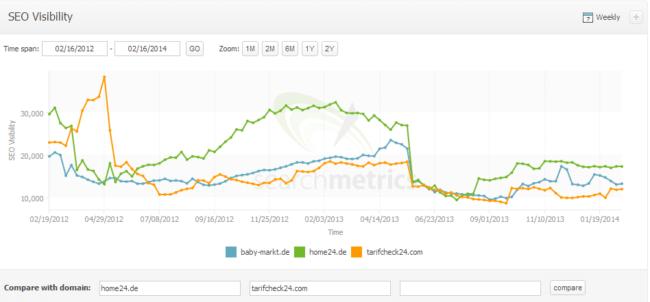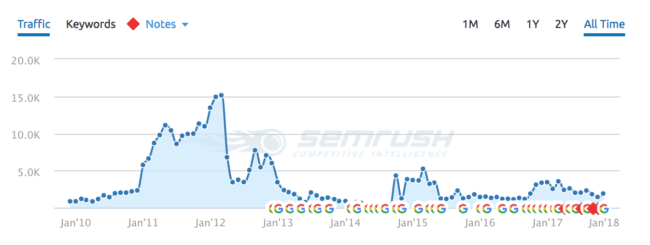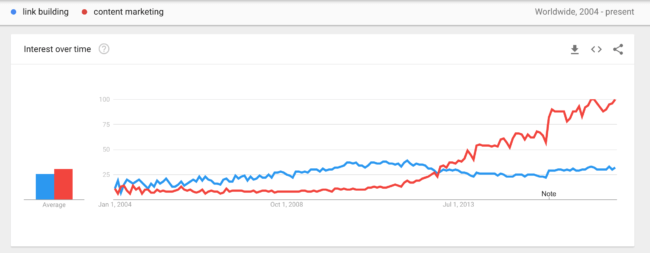Misinformation runs rampant in the SEO world. Back before Google’s Penguin algorithm launched on April 24th 2012, link building was easy and relatively safe. If you built too many exact match anchor text links, the worst that would happen to you was that you’d rank better.
After April 24, 2012 when Penguin was released to target manipulative link building, the industry changed. Many SEOs have become scared of acquiring links for clients that contain the words for which they are trying to rank in the link text (aka anchor text).
But is this necessary, or are a lot of SEOs just unnecessarily scared?
We are going to discuss three things:
- What is anchor text?
- Does anchor matter in 2018?
- How should this knowledge affect your link building efforts?
Table of Contents
What is anchor text?
Anchor text is the words contained within a links. In fact, at the beginning of this paragraph you see a meta example of anchor text where [anchor text] is, in fact, the anchor text.
Trippy!
The idea of anchor text mattering towards a page’s ranking comes from Google’s original PageRank patent (named after Google’s Larry Page) which says the following:
Hyperlink Search Engine, developed by IDD Information Services, (http://rankdex.gari.com/) uses backlink information (i.e., information from pages that contain links to the current page) to assist in identifying relevant web documents. Rather than using the content of a document to determine relevance, the technique uses the anchor text of links to the document to characterize the relevance of a document. The idea of associating anchor text with the page the text points to was first implemented in the World Wide Web Worm (Oliver A. McBryan, GENVL and WWWW: Tools for Taming the Web, First International Conference on the World Wide Web, CERN, Geneva, May 25-27, 1994). The Hyperlink Search Engine has applied this idea to assist in determining document relevance in a search. In particular, search query terms are compared to a collection of anchor text descriptions that point to the page, rather than to a keyword index of the page content. A rank is then assigned to a document based on the degree to which the search terms match the anchor descriptions in its backlink documents.
Read the second half closely.
Google, and essentially every other search engine since them, has tried to use anchor text to help them determine a page’s relevance to the query searched. A rank is then assigned to a document based on the degree to which the search terms match the anchor descriptions in its backlink documents.
Now, remember that this patent was written 20 years ago in 1997. When you take that into account, you can see why SEOs built their keyword and link acquisition tactics around it – because it worked.
There are four main types of anchor text:
- Exact match (eg “best nike shoes”)
- Partial match (eg “check out these Nike shoes”)
- Branded (eg “Amazon”)
- Naked (eg “https://getcredo.com/pros/seo/”)
As the years went on, SEOs started to do all sorts of things to rank sites that maybe didn’t deserve to rank where they did. Low quality affiliates outranking brands for queries, spam, and more. The search results suffered.
Recent anchor text history
From 2009-2012, the tension between SEOs and the search engines felt palpable. As a consultant at the time, I was constantly torn between doing what I knew would work for my clients right then (exact anchor text) and what I knew would work long term (building great content, earning branded and varied anchor links).
In April 2012, the search engines finally did what we all knew they would do – release an algorithm change that fundamentally changed the way links worked and search engines ranked sites. If you had been building exact match anchor text links for a long time, you probably ended up in a world of hurt.
Here is an example of a site that had a lot of exact match anchors that was hit hard by Penguin (site in orange):

Image via LinkResearchTools
Now, I’m not assigning any morality to this nor saying that exact match anchors were precisely the reason for their drop, but you can see just how strongly Penguin affected some sites and has continued to over the years. This site has never recovered and continued to be affected by algorithm changes.
Here is another site that I know for a fact had a lot of exact match anchor text links built to it, because I and the team I was on built them. This was 2010/early 2011 and was the link building we were taught to do. Look how hard they were hit in Penguin (data via SEMrush):

Does anchor text matter in 2018?
For as long as search engines are around, I personally believe that links will always remain a very strong part of their algorithm and anchor text will continue to matter.
However, the search engines have also been incorporating other signals into their algorithms and testing changes to search results faster than ever before in the last couple of years. John Mueller and Gary Illyes of Google have both said publicly that Google is making changes at least every day and often multiple changes per day. I even saw one piece recently where they said that they are doing 500+ changes and tests per year.
So the search engines are iterating quickly and incorporating new signals as well as making their algorithms more complex and specific to types of ranking, such as answer boxes and local maps, as well as specific industries.
You read that right. I believe (as do most SEOs I know who are worth listening to) that Google weights different ranking factors differently depending on the industry in which you are playing and the type of query that is run.
In some industries every competitor has a lot of exact match anchor text links, including the major brands. While the search engines have shown in the past that they are willing to penalize large brands (one thinks of Overstock, JCPenney, and RapGenius to name a few) and very publicly, they are not willing to do it forever at the detriment of their most important (read: most monetizeable) queries.
Imagine if Nike started doing something nefarious. Do you really think Google wouldn’t let them rank for [nike air max] for any meaningful amount of time? Definitely not.
If every competitor in your industry is very aggressive with link building, then to be honest you have to be aggressive in order to rank. And the riskiness of those strategies is way less than in another industry where your main competitors have very few links.
Be careful if you’re not a brand
Some SEOs have complained about it for years, but the search engines undeniably give preference in the search results to companies that you think of as a brand. There’s debate in the SEO world about if this is because they’re a known brand, because they spend millions of dollars a year with Google advertising their products, or if they simply have a stronger backlink profile than other sites and therefore they can rank better.
All that aside (though SEOs will debate you to your last breath about it), it is undeniable that brands are able to get away with a lot more than non-brands, especially if they don’t push it too far. I can’t tell you exactly where too far is, but basically if you are being very obvious about it by doing something dumb like buying links en masse, you’ll probably be totally fine.
Sites that are not brands might not get hit more often than large sites (though anecdotally I’d probably argue that they do), but I can assure you that it takes a lot longer for them to get out of Google’s doghouse/sandbox than a large brand because of the reasons I listed above – Google has to care about the quality of their organic search results even though they make no money from it.
Google has to care about the quality of their organic search results even though they make no money from it.
The area where large sites do have it tougher is that they are under more scrutiny, and when they are caught and punished (even if for a shorter amount of time than a smaller competitor), they lose a lot more in sales and negative PR during that time than a smaller competitor. For most, it’s just not worth it.
“Not brands” can get away with things too
That said, sites that are not large well known brands can get away with a lot. Because they’re smaller, they’re able to fly under the radar a lot easier than a large well known brand. They’re able to experiment, do things that are slightly outside of the lines, and probably have less risk of being caught as long as they don’t push it too far, as I said above.
All this said, smaller brands might lose less in revenue than a larger brand if they are penalized or affected by an algorithm change, but they also have way fewer resources at their disposal to get out of the penalty. The search engine’s search results will not suffer nearly as much, so the search engines are much less willing to put time into your case and help you recover.
And if you’re a smaller brand that relies on organic traffic, a manual or algorithmic penalty could be a death knell to you business. Aside from diversifying your traffic sources to guard against this (which is something I recommend every brand should do), you also should focus on building good strong links over time, via great content and promotion of that content and your brand (and potentially founders), instead of getting links from just resources pages and directories.
How should this affect your link building strategies?
Knowing the definition and types of anchor text as well as the history behind the classic SEOs vs search engines battle over it and what the SEO industry knew/knows works, how should you think about anchor text as it relates to your link building strategies?
I have a few thoughts and recommendations.
Stop thinking about “link building”, think about links from marketing
I know why SEO professionals are constantly harping on the need to do link building – firstly because it works and secondly because many of them make a great living from doing it for companies who need it.
But I advise business owners to think less about “link building” and more about what will actually move the needle on your business. Are you building links for the sake of ranking better, or are you doing things that get you links that also build your brand recognition and reputation online?
Instead of “link building”, I encourage you the business owner or marketing director to think about what your brand can do to get other websites to talk and write about you, and from that earn links that are not only going to help you rank but can also drive traffic that converts.
Now, a lot of SEO professionals will say that I am being short sighted here because the value of a link builder is to help you get more links out of the content and brand work you are doing. I agree with this and agree that there are a great many agencies out there (we have some listed here) who do fantastic work helping you define, create, and promote the content and help you get all the links out of it that you can.
But start with “we should do things to build our brand and get others to know about us”, not “we need more links to rank”. Links are an avenue to an end, that being better rankings and a bigger business.
All of this is partially why a lot of companies have moved from “link building” to “content marketing”, which can also be seen in Google Trends:

Know what your competitors are doing
Second, you need to know what your competitors are doing. Whether you have the ability to do this yourself or want to pay someone to do it for you (any good link building company can do this research for you), you should have a competitive link analysis done to know exactly:
- how your competitors are outranking you, and
- what you can do to start to outrank them.
Knowing how competitive and aggressive your industry is with their links is the right place to start.
Assess your risk tolerance and budget
Once you know exactly how your competitors are ranking, you need to assess your business’s tolerance for risk should somewhat risky behavior be required to rank. The more competitive your industry is, the more risky behaviors you may be required to undertake to be competitive with SEO anytime soon.
This also comes at a financial price if you pay a consultant or agency to build the links for you, and it will take time. Good links and link building companies require a decent budget, and if you are in a competitive industry the budgets can reach into the high four or even five figures. You won’t get the results you want from someone charging a couple hundred dollars a month. Good agencies charge that for a single link, and a piece of content that can earn you a lot of links (with some good outreach done) can cost in the thousands of dollars.
Hire the right provider and expect it to take time
If you’re ready to invest in good quality content marketing that also earns you the links and gets your website/business the traffic you need to grow, then Credo can help.
Get started here with a discussion with us and then we can get you introduced to the right agencies/consultants for your individual needs, and then support you through the process of hiring someone.

